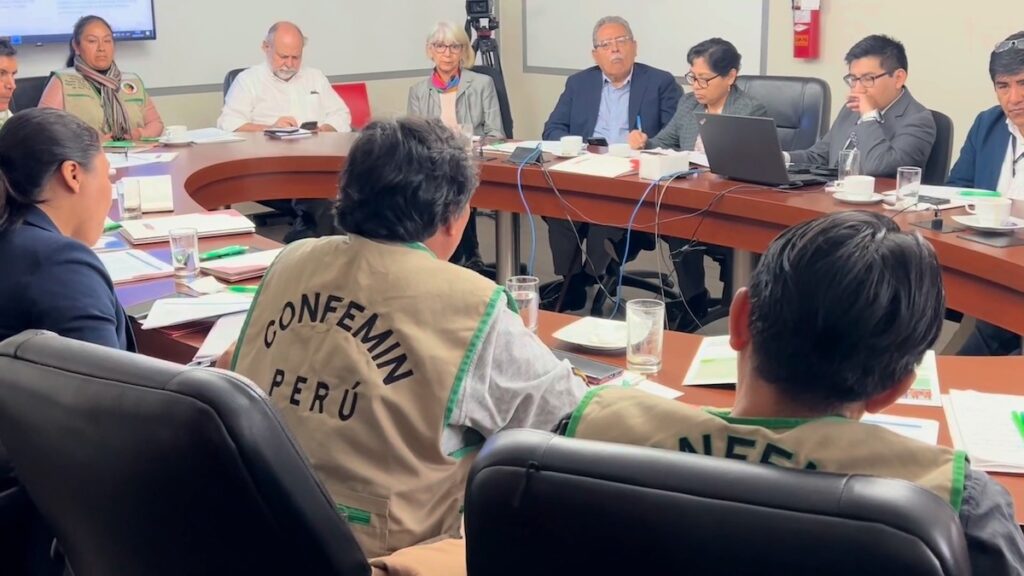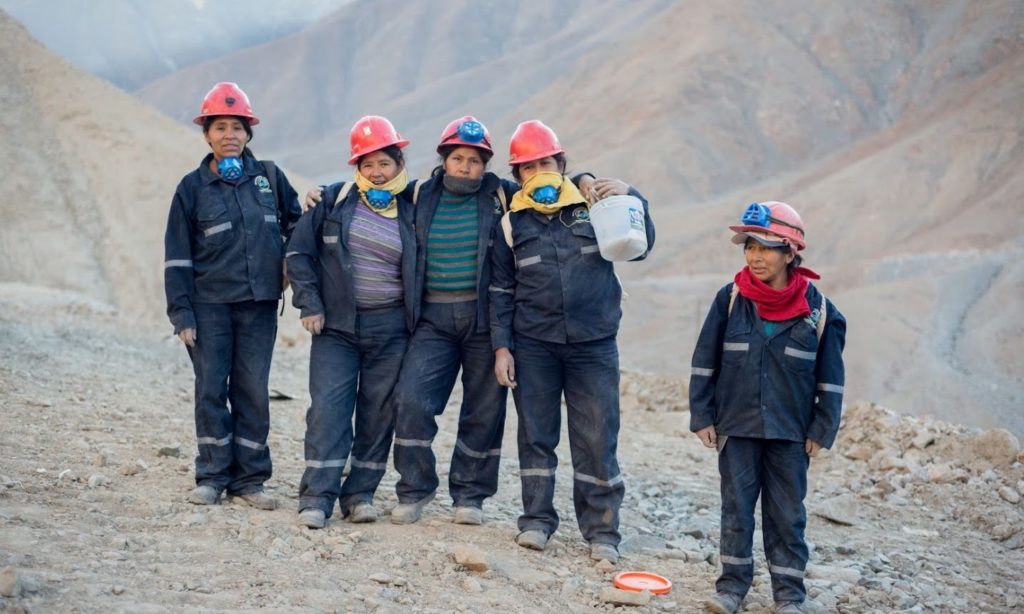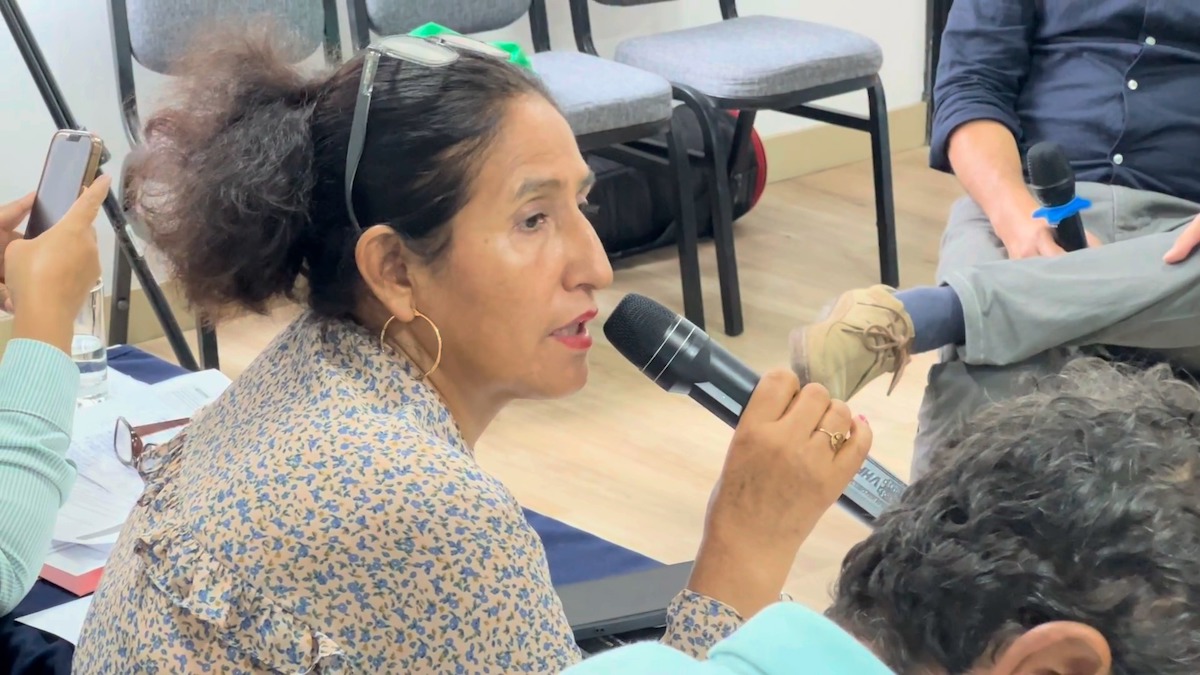Women brought a unique perspective to the dialogue roundtables working to shape new mining legislation in Peru.
In April, 2025, the General Directorate of Mining Formalization (DGFM) of the Peruvian Ministry of Energy and Mines convened seven multi-stakeholder technical roundtables. These sessions were integral to a participatory process aimed at gathering vital input and comments for the new ASM Law.
By bringing together diverse stakeholders, the roundtables sought to strengthen the existing regulatory framework, and foster a more representative, effective law that tackles the sector’s challenges and contributes to genuine sustainability.
Solidaridad played a pivotal role via the RECLAIM Sustainability! programme by supporting the Dialogue Group for Mining and Sustainable Development, a civil society collective tasked with facilitating the technical roundtables. Solidaridad’s assistance—including methodology design, session facilitation, and detailed report preparation—ensured a rigorous, inclusive, and participatory dialogue, aligned with our commitment to strengthening civil society.
Likewise, Solidaridad was instrumental in convening and securing the participation of women miners’ organizations, who have historically been excluded from decision-making spaces. The women’s demands and their unique perspectives were incorporated into the new law thanks to the work of the National Network of Women in ASM (RNM-MAPE) and the Madre de Dios ASM Women’s Network.
This direct involvement highlights Solidaridad’s transformative social and gender inclusion approach to decision making. The inclusive approach challenges the root causes of exclusion and inequality, and ensures that miners’ voices are at the center of the policy-making process.
Building consensus and identifying dissent through multi-stakeholder dialogue
The technical roundtables engaged the three key pillars necessary for systemic change:
- ASM organizations – These groups of organized artisanal and small-scale miners provided firsthand insights into the daily needs and challenges faced by those directly involved in mining. This ensures that miners’ voices are heard and their socio-economic situations can be improved.
- The National Society of Mining, Oil and Energy – This group represented the interests and vision of the larger mining sector. Their perspective, though often clashing with that of ASM miners operating within their concessions, is vital for achieving comprehensive policies and innovative business models.
- Civil society organizations, NGOs, academic institutions, and research centers – These contributors, embodying a vibrant and strong civil society, provided valuable technical knowledge and specialized analyses to enrich the debate.
Digging into the details
Discussions in the round tables spanned critical topics, such as traceability, taxation, gold trading, financial inclusion, formalization, mining rights, environmental management, and institutional governance. This thorough discussion helped pinpoint common ground and diverging thoughts, and pushed concrete proposals that can enhance the future legal framework through inclusive regulatory frameworks.

One of the main areas of common ground was the need to understand formalization as a comprehensive process that encompasses traceability, financial inclusion, access to formal markets, environmental protection, and a tax regime adapted to the reality of ASM operators. There was broad agreement that without a supportive administrative environment, regulations are insufficient for the necessary structural change that support inclusive sustainable value chains.
Stakeholders encountered significant divergences regarding traceability and the State’s role in gold trading, along with proposals for reallocating mining concessions, and redefining mining rights. Discussions on the current ASM formalization registry update further highlighted tensions: some advocated for the immediate removal of ASM miners who hadn’t achieved formalization, while others proposed a more gradual approach, combining compliance steps with technical support. This reflected a critical tension between approaches favoring control and exclusion versus those promoting progressive inclusion and rebalancing power.
Amplifying the voice of women miners

The systemic exclusion of women from decision-making within the ASM sector has historically prevented their specific needs from being adequately addressed in legislation. Confronting this, RNM-MAPE underscored the urgent imperative to formally recognize and integrate the labor of manual mineral sorters (known as “pallaqueras”) into the new law. They further advocated for establishing fairer trading conditions for the ore these women produce, directly contributing to a more equitable value distribution across the chain.
In addition, the Madre de Dios ASM Women’s Network drew attention to the prevalent security threats they face locally, alongside the complex problem of overlapping land and mining concessions that impede their operations. Such issues underscore the need for a supportive public sector to resolve these fundamental land use conflicts, and foster an enabling environment for responsible ASM miners in the region.
Representatives from both networks emphasized the urgency of addressing these issues and ensuring the realities of all stakeholders are included in the new law. They also specifically acknowledged Solidaridad’s crucial support in ensuring their participation in these technical roundtables, which allowed them to amplify their voices.
“It’s important that all voices are heard and that the situation and daily challenges of those involved in ASM are taken into account. Solidaridad is an important ally supporting our participation in these spaces.”
Griselda Zubizarreta, president of the ASM Women’s Network of Madre de Dios as she highlights the importance of civil society groups in policy development.
Driving systemic change: Next steps and future implications
The contributions, findings, and conclusions of this robust inclusive dialogue process will be compiled in a technical report that will be submitted to the legislative body responsible for debating and approving the new regulations. This report will serve as a foundational document for legislative discussion and the eventual enactment of the new ASM Law, aiming to ensure that the aspirations and needs of all sector stakeholders are duly considered within a supportive public sector.
About RECLAIM Sustainability!
The comprehensive work detailed in this article falls under RECLAIM Sustainability!, Solidaridad’s joint five-year program (2021-2025) with Fairfood, TrustAfrica, and Business Watch Indonesia, established in strategic partnership with the Dutch Ministry of Foreign Affairs. This program’s central objective is to foster genuine and inclusive sustainability across global value chains by ensuring the voices of farmers, miners, workers, and citizens are effectively integrated into decision-making, while fundamentally strengthening civil society and upholding gender and social inclusion as core principles. Read more here.

